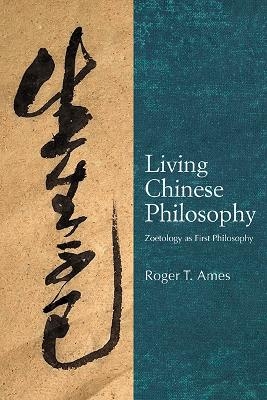
Living Chinese Philosophy
Zoetology as First Philosophy
Seiten
2024
State University of New York Press (Verlag)
978-1-4384-9953-6 (ISBN)
State University of New York Press (Verlag)
978-1-4384-9953-6 (ISBN)
Contrasts classical Greek ontology ("the science of being in itself") with Confucian "zoetology" ("the art of living").
In Living Chinese Philosophy, Roger T. Ames uses comparative cultural hermeneutics as a method for contrasting classical Greek ontology ("the science of being in itself") with classical Chinese "zoetology" ("the art of living"), which is made explicit in the Yijing 易經 or Book of Changes. Parmenides, Plato, and Aristotle give us a substance ontology grounded in "being qua being" or "being per se" (to on he on) that guarantees a permanent and unchanging subject as the substratum for the human experience. This substratum or essence includes its purpose for being (telos) and defines the "what-it-means-to-be-a-thing-of-this-kind" (eidos) of any particular thing, thus setting a closed, exclusive boundary and the strict identity necessary for a particular thing to be "this" and not "that." In the Book of Changes, we find a vocabulary that makes explicit cosmological assumptions that are a stark alternative to this substance ontology. It also provides the interpretive context for the canonical texts by locating them within a holistic, organic, and ecological worldview. To provide a meaningful contrast with this fundamental assumption of on or "being," we might borrow the Greek notion of zoe or "life" and create the neologism "zoe-tology" as "the art of living" (shengshenglun 生生論). This cosmology begins from "living" (sheng 生) itself as the motive force behind change and gives us a world of boundless "becomings": not "things" that are but "events" that are happening, a contrast between an ontological conception of human "beings" and a process conception of what the author calls human "becomings."
In Living Chinese Philosophy, Roger T. Ames uses comparative cultural hermeneutics as a method for contrasting classical Greek ontology ("the science of being in itself") with classical Chinese "zoetology" ("the art of living"), which is made explicit in the Yijing 易經 or Book of Changes. Parmenides, Plato, and Aristotle give us a substance ontology grounded in "being qua being" or "being per se" (to on he on) that guarantees a permanent and unchanging subject as the substratum for the human experience. This substratum or essence includes its purpose for being (telos) and defines the "what-it-means-to-be-a-thing-of-this-kind" (eidos) of any particular thing, thus setting a closed, exclusive boundary and the strict identity necessary for a particular thing to be "this" and not "that." In the Book of Changes, we find a vocabulary that makes explicit cosmological assumptions that are a stark alternative to this substance ontology. It also provides the interpretive context for the canonical texts by locating them within a holistic, organic, and ecological worldview. To provide a meaningful contrast with this fundamental assumption of on or "being," we might borrow the Greek notion of zoe or "life" and create the neologism "zoe-tology" as "the art of living" (shengshenglun 生生論). This cosmology begins from "living" (sheng 生) itself as the motive force behind change and gives us a world of boundless "becomings": not "things" that are but "events" that are happening, a contrast between an ontological conception of human "beings" and a process conception of what the author calls human "becomings."
Roger T. Ames is Humanities Chair Professor in the Department of Philosophy at Peking University. His published works include translations of the Chinese philosophical canons and several interpretive studies.
Introduction: Rehearsing the Argument
1. Comparative Cultural Hermeneutics as Method
2. Unloading the Essentialism Charge
3. "Taking the Confucian Tradition on Its Own Terms"
4. Classical Greek Ontological Thinking
5. Classical Chinese Zoetological Thinking
6. In Their Own Words and on Their Own Terms
Epilogue
Bibliography
Index
| Erscheinungsdatum | 03.09.2024 |
|---|---|
| Reihe/Serie | SUNY series in Chinese Philosophy and Culture |
| Zusatzinfo | Total Illustrations: 4 |
| Verlagsort | Albany, NY |
| Sprache | englisch |
| Maße | 152 x 229 mm |
| Gewicht | 227 g |
| Themenwelt | Geisteswissenschaften ► Philosophie ► Östliche Philosophie |
| Geisteswissenschaften ► Philosophie ► Philosophie Altertum / Antike | |
| Geisteswissenschaften ► Religion / Theologie ► Weitere Religionen | |
| ISBN-10 | 1-4384-9953-1 / 1438499531 |
| ISBN-13 | 978-1-4384-9953-6 / 9781438499536 |
| Zustand | Neuware |
| Informationen gemäß Produktsicherheitsverordnung (GPSR) | |
| Haben Sie eine Frage zum Produkt? |
Mehr entdecken
aus dem Bereich
aus dem Bereich


